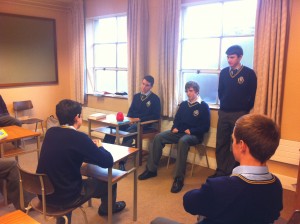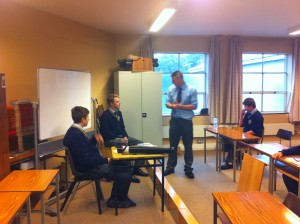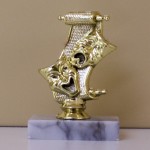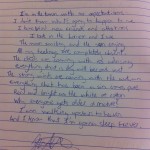Here are some important quotes from Act 3. Be sure you know and understand each of them.
Banquo: “I fear /Thou play’dst most foully for it.”
Banquo: “My duties / Are with a most indissoluble tie / Forever knit.”
Macbeth: “Fail not our feast.” Banquo: “My lord, I will not.”
Macbeth: “Filling their hearers / With strange invention.”
Macbeth: “To be thus is nothing, / But to be safely thus. Our fears in Banquo / Stick deep, and in his royalty of nature / Reigns that which would be feared.”
Macbeth: “There is none but he / Whose being I do fear;”
Macbeth: “Upon my head they placed a fruitless crown, / And put a barren sceptre in my gripe.”
Macbeth: “For Banquo’s issue have I filed my mind; / For them the gracious Duncan have I murdered.”
Macbeth: “So, come Fate into the list / And champion me to the utterance.”
Macbeth: “Ay, in the catalogue ye go for men.”
Macbeth: “Though I could / With barefaced power sweep him from my sight.”
Macbeth: “For it must be done tonight / And something from the palace.”
Macbeth: “Banquo, thy soul’s flight, / If it find Heaven, must find it out tonight.”
Lady Macbeth: “Nought’s had, all’s spent, / Where our desire is got without content; / Tis safer to be that which we destroy / Than by destruction dwell in doubtful joy.”
Lady Macbeth: “Things without all remedy / Should be without regard – what’s done is done.”
Macbeth: “We have scorched the snake, not killed it”
Macbeth: “But let the frame of things disjoint – / Both the worlds suffer – / Ere we will eat our meal in fear and sleep / In the affliction of these terrible dreams / That shake us nightly.”
Macbeth: “Duncan’s in his grave; / After life’s fitful fever he sleeps well, / Treason has done his worst; nor steel, nor poison, / Malice domestic, foreign levy, nothing / Can touch him further.”
Lady Macbeth: “Gentle my lord, sleek o’er your rugged looks, / Be bright and jovial among your guests tonight.”
Macbeth: “Make our faces vizards to our hearts / Disguising what they are.”
Macbeth: “O, full of scorpions is my mind, dear wife.”
Macbeth: “Ere the bath hath flown / His cloistered flight…there shall be done / A deed of dreadful note.”
Macbeth: “Be innocent of the knowledge, dearest chuck / Til thou applaud the deed – Come seeling night… / Cancel and tear to pieces that great bond / Which makes me pale!”
Macbeth: “Things bad begun make themselves strong by ill.”
Macbeth: “You know your own degrees; sit down: / At first and last the hearty welcome.”
Macbeth: “We’ll drink a measure / The table round.”
Macbeth: “Tis better thee without than he within.”
Macbeth: “Thou art the best o’ th’ cut-throats… / …thou art the non-pareil.”
Macbeth: “Then comes my fit again; / I had else been perfect – / Whole as the marble, founded as the rock.”
Macbeth: “Now I am cabined, cribbed, confined, bound in / To saucy doubts and fears.”
First murderer: “In a ditch he bides, / With twenty trenched gashes on his head; / The least a death to nature.”
Macbeth: “There the grown serpent lies; the worm that’s fled / Hath nature that in time will venom breed.”
Lady Macbeth: “You do not give the cheer; the feast is sold.”
Macbeth: “Here had we our country’s honour roofed, / Were the graced person of our Banquo present.”
Macbeth: “The table’s full.”…”Which of you have done this?”
Macbeth: “Thou can’st not say I did it – never shake / Thy gory locks at me.”
Lady Macbeth: “Sit worthy friends, my lord is often thus… / The fit is momentary; upon a thought / He will be well again.”
Lady Macbeth: “Are you a man?”
Macbeth: “Ay, and a bold one, that dare look on that / Which might appal the devil.”
Lady Macbeth: “O proper stuff! / This is the very painting of your fear: /This is the air-drawn dagger which, you said, / Led you to Duncan… / When all’s done / You look but on a stool.”
Macbeth: “Our monuments shall be the maws of kites.”
Macbeth: “The times have been / That, when the brains were out, the man would die, / And there an end; but now they rise again, / With twenty mortal murders on their crowns, / And push us from our stools.”
Lady Macbeth: “My noble lord, / Your worthy friends do lack you.”
Macbeth: “I have a strange infirmity, which is nothing / To those that know me.”
Macbeth: “To our dear Banquo, whom we miss; / Would he were here.”
Macbeth: “Avaunt and quit my sight, let the earth hide thee – / Thy bones are marrowless, thy blood is cold.”
Macbeth: “What man dare, I dare: / Approach thou like the rugged Russian bear, / The armed rhinoceros, or the Hyrcan tiger, / Take any shape but that.”
Macbeth: “Hence, horrible shadow / Unreal mockery, hence.”
Lady Macbeth: “You have displaced the mirth, broke the good meeting, / With most admired disorder.”
Macbeth: “Can such things be, / And overcome us like a summer’s cloud.”
Macbeth: “You can behold such sights / And keep the natural ruby of your cheeks, / When mine is blanched with fear.”
Lady Macbeth: “He grows worse and worse / Question enrages him… / Stand not upon the order of your going, / But go at once.”
Macbeth: “It will have blood they say: blood will have blood.”
Macbeth: “There’s not a one of them but in his house / I keep a servant fee’d.”
Macbeth: “Now I am bent to know, / By the worst means the worst. For mine own good / All causes shall give way. I am in blood / Stepped in so far, that should I wade no more, / Returning were as tedious as go o’er: / Strange things I have in head that will to hand, /Which must be acted ere they may be scanned.”
Lady Macbeth: “You lack the season of all natures, sleep.”
Macbeth: “We are yet but young in deed.”
Hecate: “Loves for his own ends, not for you”
Hecate: “And by the strength of their illusion / Shall draw him on to his confusion.”
Hecate: “He shall spurn fate, scorn death, and bear / His hopes ‘bove wisdom, grace and fear.”
Hecate: “Security / Is mortal’s chiefest enemy.”
Lennox: “The gracious Duncan…the right valiant Banquo…to kill their gracious father…How it did grieve Macbeth…”
Lennox: “And ’cause he failed / His presence at the tyrant’s feast, I hear / Macduff lives in disgrace.”
Lord: “The most pious Edward”
Lord: “We may again / Give to our table meat, sleep to our nights / Free from our feasts and banquets bloody knives”
Lord: “He prepares for some attempt of war.”
Lennox: “That a swift blessing / May soon return to this our suffering country, / Under a hand accursed.”








